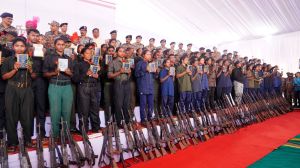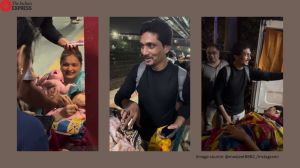The mess in Sierra Leone
All is not well with the UN peacekeeping operations in Sierra Leone, where last year the blue berets had been sent in to bring back into t...

All is not well with the UN peacekeeping operations in Sierra Leone, where last year the blue berets had been sent in to bring back into the mainstream all the warring rebel factions battling it out with the country’s army or what remained of it. As if it were not bad enough that hundreds of armed UN peacekeepers have been taken hostages, infighting has now been triggered off by the charge of Indian Commander of the UN force Maj-Gen. V.K. Jetley that two of his own Nigerian deputies have sabotaged the peace process. This highlights certain inadequacies in the command and control, organisational structure and operational strategies adopted so far, which the UN Secretary-General and his commanders would do well to take note of.
Another complicating factor lies in the business and security interests of certain international agencies and firms working independently and at cross-purposes in diamond-rich Sierra Leone and its unstable neighbourhood.
The mission has gone awry and off-track. A force sent in for peacekeeping today finds itself caught in a peace enforcement role, requiring major augmentations in force levels, weaponry and equipment including helicopter gunships and, above all, a total change in its operational and strategic concepts. It should have been anticipated that the task of reintegrating all the fighters and the factions would involve disarming (and fighting to disarm in many cases), re-indoctrination, demobilisation of all weapon and ammunition stockpiles, and a dependable logistic infrastructure in this jungle-infested country where communication networks are virtually non-existent.
It would have also helped, had the UN headquarters, after selecting its Force Commander, held intensive consultations with Gen. Jetley, providing himsufficient intelligence inputs about his area of operations, and arrived at aviable force level. The UN level in any deployment zone depends more on the tasks allocated than the contribution in terms of troops that a particular country is prepared to make or not to the UN efforts. As it is, the various troop contingents kept coming in piecemeal and, worse still, were inducted into battle almost immediately. Besides, the logistic infrastructure on the ground could not cope with the advance of the troops on various axes, leadingto detentions of fully armed troops and a certain loss of face which could have been avoided. The composition of Gen. Jetley’s own headquarters where the principal staff officers hail from many nationalities, does not lend itself to effective operational control. This kind of composition could possibly work out in a more peaceful environment. In an actual combat zone, one field task force headquarters at Freetown, staffed predominantly by one country (the one providing the bulk of the fighting force) would have paid better operational dividends besides leading to better command and control.
Another issue to be addressed is the attitude of some of the nations employedfor UN peacekeeping, especially in tough-terrained trouble spots in Asia andAfrica. With many Western nations more disposed to carrying out such operations in and around Europe, a view has to be taken of the overall futureof the UN role in this regard around the world. The troop composition of the force from the world’s North and South, the command and control (with some Western nation troops not happily accepting non-Western commanders as happened in Yugoslavia with another Asian general some years ago, and a broad time limit for the force’s pullout — all this needs to be formalised well before the start of any UN operation.
Another disquieting issue to emerge is of the leadership and morale of the force. No offence to Gen. Jetley meant, but it must be accepted that his leadership so far has not generated the morale that goes to make a match-winning team in a multinational environment. Possibly, his style was cramped by the visits of Defence Minister George Fernandes and the DGMO at our Army headquarters at New Delhi all rushing off to Freetown to congratulate the Indian contingents there, as if it were not a UN but an Indian Army operation at home. Meanwhile, the head of the Nigeraian army has asked for a replacement of Gen. Jetley over the issue of his two Nigerian deputies. The mess could have been avoided by a better selection of the force commander.






- 01
- 02
- 03
- 04
- 05

























